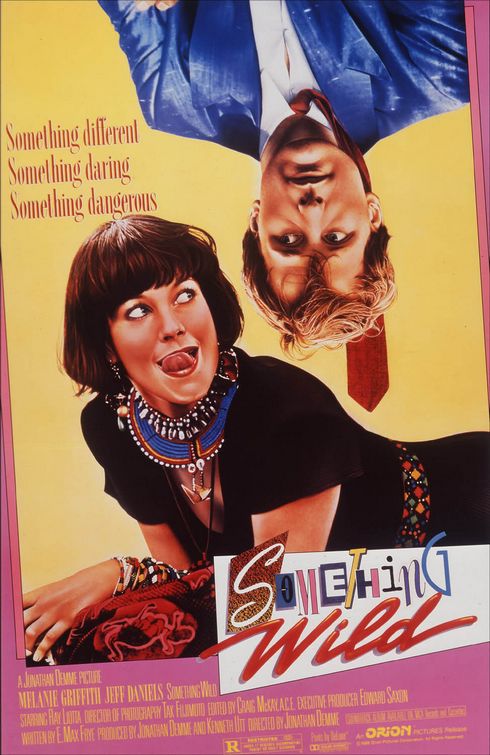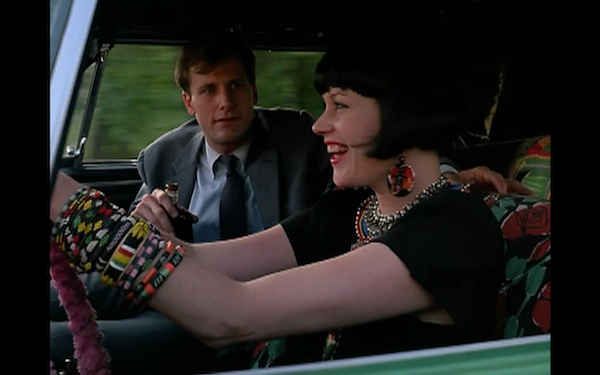 In tallying the output of the late Jonathan Demme, I find that the criminally underrated SOMETHING WILD (1986) ranks near the top. An independently made film, it followed several years of labor in the Hollywood trenches for this Roger Corman acolyte, a period that culminated in the Goldie Hawn vehicle SWING SHIFT (1984), which ended up heavily recut by Warner Bros (something that seemed to trouble Demme right up to the day of his 2017 demise).
In tallying the output of the late Jonathan Demme, I find that the criminally underrated SOMETHING WILD (1986) ranks near the top. An independently made film, it followed several years of labor in the Hollywood trenches for this Roger Corman acolyte, a period that culminated in the Goldie Hawn vehicle SWING SHIFT (1984), which ended up heavily recut by Warner Bros (something that seemed to trouble Demme right up to the day of his 2017 demise).
SOMETHING WILD represented a regrouping, a film that generously partook of the exploitation of Demme’s earlier films, and also the quirkier and more humanistic bent of his later ones. Unfortunately Orion misunderstood the film and marketed it as a screwball comedy, with box office results that were underwhelming—although SOMETHING WILD probably didn’t have much of a chance anyway, given that a similarly-oriented film, David Lynch’s BLUE VELVET, beat it to theaters by a few weeks (BLUE VELVET bowed in late September of ‘86 and SOMETHING WILD in early November) and completely stole its thunder.
SOMETHING WILD represented a regrouping, a film that generously partook of the exploitation of Demme’s earlier films, and also the quirkier and more humanistic bent of his later ones.
It stars Jeff Daniels as Charles, an absurdly buttoned-down NYC stockbroker who while on a Friday afternoon lunch break decides to skip out on paying for his meal. His actions are noticed by Lula, a.k.a. Audrey (Melanie Griffith), a free-spirited young woman who’s fascinated by Charles’ “inner rebel.” Enticing him into her (stolen) car, she quickly introduces him to the delights of fast driving, petty thievery and sexual excess during a cross country jaunt that takes them to her cozy Pennsylvania hometown, and her high school reunion.
It’s there that they come into contact with Ray (Ray Liotta), Audrey’s psychotic ex, who’s just been released from prison. Like Audrey and Charles, he’s partial to bad behavior, but adds a more dangerous, violent element to this formerly carefree sex-and-crime spree. Eventually he elects to make off with Audrey and send Charles on his way, forcing the latter into becoming a most unlikely hero.

The script was written by E. Max Frye, who would go on to pen the lesser films AMOS AND ANDREW, PALMETTO and FOXCATCHER. SOMETHING WILD was his first screenplay sale, and found a perfectly matched director in Jonathan Demme, with both script and director excelling in humanistic detail (such as Charles’ insistence on calling everyone he meets by their first name) and an oddly affectionate tone.
Many critics complained about the “tonal change” from the carefree amorality of the first half to the oft-disturbing brutality of the second, but in truth the freewheeling vibe established early on is, in what is perhaps the film’s most interesting element, maintained throughout. It’s as if the film doesn’t know it’s switched gears, with depictions of mayhem and brutality presented with the same quirky affection suffusing the early scenes. This approach has been co-opted by the films of Quentin Tarantino and longtime Demme admirer Paul Thomas Anderson (whose PUNCH-DRUNK LOVE tried very hard to replicate SOMETHING WILD’s oft-kilter brilliance), but it was pretty radical in 1986.
Of the actors, Melanie Griffith, back when she was one of the most daring performers in Hollywood, perfectly embodies the spirit of the film in a performance that’s quirky, sexy and consistently unpredictable. In casting Ray, Demme claims to have wanted an actor who scared him as much as he did the film’s other characters, and found that quality in the late Ray Liotta, whose extraordinary film debut this was. Jeff Daniels plays an early iteration of what would become his signature role: the non-threatening straight man whose presence is used to prop up his more flamboyant co-stars. That was the case with later Daniels performances in SPEED and DUMB AND DUMBER, and also here, where he gets squeezed out by Griffith and Liotta—and doesn’t seem to mind at all.
Other quirky folks appearing in SOMETHING WILD include the indie filmmaking legends John Sayles (as a highway patrolman) and John Waters (as a sleazy used car salesman), as well as future INDEPENDENCE DAY co-star Margaret Collin (as Ray’s not-long-for-this-movie GF), and Demme regulars like Charles Napier, Gary Goetzman, Tracey Walter (in his first but definitely not last Demme film) and Kenneth Utt (also the co-producer). Also featured are several music folks, such as reggae artist Sister Carol East (as a waitress), the rap group The Crew and the cult rock band The Feelies.
This brings up what I feel is the film’s most off-putting element: it tries too hard to be hip, with trendy eighties tunes played nonstop and Griffith called upon to display a succession of very up-to-the-minute fashions (that minute, obviously, has passed). Still, Demme gets most everything else right, so I’m willing to forgive those annoyances.
Vital Statistics
SOMETHING WILD
Religioso Primitiva/Orion Pictures
Director: Jonathan Demme
Producer: Kenneth Utt, Jonathan Demme
Screenplay: E. Max Frye
Cinematography: Tak Fujimoto
Editing: Craig McKay
Cast: Jeff Daniels, Melanie Griffith, Ray Liotta, George Schwartz, Margaret Colin, Leib Lensky, Tracey Walter, Maggie T., Patricia Falkenhain, Sandy McLeod, Robert Ridgely, Buzz Kilman, Kenneth Utt, Adelle Lutz, Charles Napier, Jim Roche, John Sayles, John Waters, Dorothy Demme, Emma Byrne, Gary Goetzman, Sister Carol East
